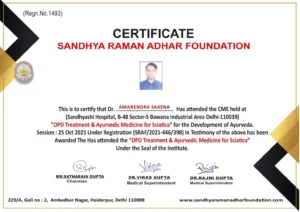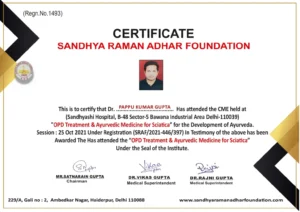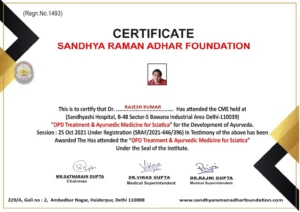Diploma in Gynaecology & Obsterics: Course, Eligibility, Syllabus, Colleges, Fees, Salary
DGO or Diploma in Gynaecology and Obstetrics course is a two-year post-graduate level program that equips the students with the required knowledge and skills related to gynaecology, fertility, diagnostic studies of the reproductive system, fetus development, labor management, and delivery, etc. The core subjects of DGO include Endometriosis, Labour and Foetus Development, Gynecologic Oncology, Surgery of Mullerian Ducts, etc., along with practical and simulation training.
Diploma in Gynaecology & Obsterics : Course Highlights
Why Study Diploma in Gynaecology & Obsterics?
DGO courses are one of the most preferred courses by MBBS or BAMS graduates for the shorter duration of the course and also the innumerable job opportunities it creates post-completion of the course. Listed below are some of the important pointers on why choosing a DGO course can be the right choice:
- The Bureau of Labor Statistics projects a growth of 1.7% in the employment of gynecologists between the years 2022-2032.
- The job role of Gynecologist and Obstetrician is among the top 5 best-paying jobs in the US
- There is an increasing demand for Gynecologist and Obstetrician skilled professionals as the American College of Obstetricians and Gynecologists (ACOG) predicted a shortfall of Ob-Gyns of up to 22,000 by 2050.
Diploma in Gynaecology & Obsterics Eligibility
The eligibility criteria for admission to Diploma in Gynaecology & Obsterics are as follows:
- Applicants must qualify BAMS, BUMS, BNYS, MBBS, BHMS with a minimum aggregate of 50% and above from a recognized board.
- Candidates should have completed minimum 18 years of age at the time of admission.
Diploma in Gynaecology & Obsterics Syllabus
1. Use of Garb Sanskar
2. Use of garb pal ras in
Pregnancy
3. Use of phalagrtum in infertility
4. Treatment of mudgarbha
5. Use garb dharak yoga in ant natal care to achieve pregnancy
Topic covered:
1. Modern aspect
2. Ayurveda
3. Naturopathy
4. Causes
5. Definition
6. Causative factor
7. Pathophysiology
8. Test
Examination
1. Astavidha pariksha
2. Nadi pariksha
3. Dashvidha pariksha
4. Treatment
5. Procedure
6. Medicine
7. Outcome
Comparative study among 10 patient
In view of modern
1. Ayurveda
2. Naturopathy
Dgo 2nd year.
1. Concept of Tridosha, Dhatu, Upadhatu, Agni, Pancha Mahabhuta in relation to Prasuti and Stri
Roga.
2. Concept of Artava and Shukra.
3. Concept of Rasa, Guna, Veerya, Vipak and Karma of Dravya used in Prasuti and Stri Roga.
4. Action and adverse drug reaction related to commonly used plants and Rasa Aushadhi in
Prasuti and Stri Roga.
5. Concept of Pathya- Apathya in relation to Prasuti and Stri Roga.
6. Concept of Garbhadhan and Garbha.
7. Concept of Vrana and Vrana dushti.
(B)
1. Concept of special therapies of Ayurved used in Prasuti and Stri Roga.
2 Concept of Ashtavidha Shastra Karma,Yantra & shastra used in Prasuti and Stri Rog
3. ante-natal, Natal and Post natal counseling and examination.
4 Diseases in the Urinary System.
5.Diseases in Vulva.
6.Cervix Diseases.
(C)
1.ethics, law and Acts Related to gynaecology and obstetrics – laws of abortion and adoption
2.National Health Programmes to improve maternal and child health, social obstetrics, and vital statistics.
Child healthcare examination and management of unit management of birth asphyxia.
Detection of congenital malformation in newborn and timely referral for correction.
3. Postnatal care sutika vigyan sutika paribhasha. kal maryada Parichay .
4. Shrutika vidhi and their chikitsa.
5. Stana Sampat,Stana Sampat Sanya Pariksha, Stana vriddhi , kshaya and dusti Karna ,Lakshya and its chikitsa stana shotha ,Stana vidhradhi.
6. Lactation disorder
(D)
Hospital duties in OPD, IPD, docoments .
Knowledge of instruments required in gynaecology and obstetric practices.
5. Blood transfusion and replacement of blood constituents management of fluid and electrolyte imbalance in quiry and office procedure recent studies and advancement in the field of prastuti tantra
Contraception and sterilizations
REFERENCE BOOKS
Prasuti tantra evum stree roga by prof Tewari P V
3. Concepts of gynecology Dr Nirmala G Joshi.
4. Prasuti Tantra Prof. M. Dwivedi
5. Stree roga vigyan – Dr VNK Usha
6. Navya prasuti Vigyan Dr Pooja Bharadwaja
7. Text book of gynaecology-Berek and Novak.
8. Text book of obstetrics- Williums
9. Text book of obstetrics- D C Dutta
10. Text book of gynaecology – D C Dutta
11. Gabbe’s normal and problem pregnancies.
12. Human embryology by Saddler.
13. Jeffcoat’s principles of gynaecology
Diploma in Gynaecology & Obsterics Jobs
After graduating from a Diploma in Gynaecology and Obstetrics, some of the career options available include:
- Consultant
- Clinic Associate
- Obstetrician
- Gynaecology Specialist
- Infant Care Paediatric specialist
- Senior Gynaecology Surgeon
- Surgeon
- Lecturer
Diploma in Gynaecology & Obsterics Scope
A Diploma in Gynecology and Obstetrics (DGO) opens up a world of possibilities for a graduate. A successful career in this field leads to prestigious positions. Those with this degree can pursue a Ph.D. or pursue higher studies. The salary for doctors in this field ranges from Rs. 3 to 4 lacs per year.
A doctor in the field of obstetrics and gynecology must have at least a bachelor’s degree in either medicine or surgery. After completing the undergraduate degree, a rotatory internship is mandatory. Thereafter, a doctor should pursue an M.D./M.S. or a postgraduate diploma course. Obstetricians are in demand in many areas and may even find work in pharmaceutical companies.
DGO graduates can pursue a career in the private or public sector. They can work as obstetricians, Family Planning consultants, lecturers, Clinic Associates, and Senior Infant Health Care specialists. Other job opportunities include Senior Gynecology Surgeon, Obstetrician, and Surgeon. Some may also choose to do research.
OUR CERTIFIED STUDENTS


